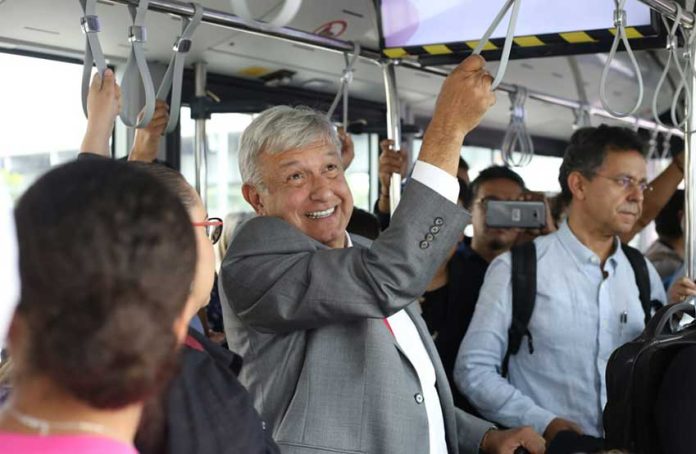President-elect Andrés Manuel López Obrador pledged yesterday that a new federal Public Security Secretariat (SSP) will be in place when he starts his presidency on December 1, and reiterated today that all options are on the table in the quest to achieve national peace.
Speaking upon his arrival in Ciudad Juárez, Chihuahua, where he presided today over the first of a series of security forums, López Obrador also said that a new attorney general and anti-corruption and electoral prosecutors will have been appointed by the time he is sworn in.
To achieve the goals, the president-elect said he was certain that he will have the support of President Enrique Peña Nieto, adding that he hoped to meet with him soon to formalize his request.
Between 2000 and 2013, Mexico had a federal SSP but Peña Nieto dissolved the department in 2013 and replaced it with the National Security Commission, which was incorporated into the Secretariat of the Interior.
After an initial drop in violent crime, homicides increased in the second half of Peña Nieto’s six-year term and 2017 saw more murders than any other year in the past two decades.
This year is on track to be even more violent, with homicide numbers for the first six months of the year up 15% compared to the same period last year.
López Obrador, or AMLO as he is commonly known, and his prospective cabinet have signaled that they plan to change course on security. Under consideration are drug legalization and an amnesty law that could pardon those forcibly recruited by organized crime.
Alfonso Durazo, who AMLO has tapped to head up the new SSP, has also said that the incoming government plans to gradually withdraw the military from public security duties on the nation’s streets, a strategy adopted by former president Felipe Calderón in 2006 and continued during the current administration.
“We believe that we’re not going to resolve the problems of insecurity in this country with more force or more military support,” Durazo told Al Jazeera in an interview published today.
To refine its security strategy, the incoming government plans to hold 19 security forums and 25 public consultations across the country at which victims, civil society groups, local politicians, religious leaders and academics, among others, will be invited to tell their stories and express their opinions and ideas about how to restore peace.
At today’s first town hall-style meeting in Ciudad Juárez, López Obrador said that nothing will be off limits during the scheduled forums, whose aim is to develop a security strategy that takes into account a broad range of perspectives.
“. . . We have to debate and not leave any issue aside. There shouldn’t be any taboos, we mustn’t self-censor, we’re free. Everything that is in the interest of the people of Mexico will be carried out. We don’t have commitments with interest groups, our only masters are the people of Mexico,” he said.
“You have complete freedom to analyze all the options. It’s not a matter of not being able to do something because a foreign government doesn’t like it. We don’t care! If it’s good for Mexico, it’s going to be put into practice.”
Durazo, who also attended the forum, said the new government will propose a “process of pacification and national reconciliation” and stressed that there will not be a pact with organized crime.
“. . . We propose building a Mexican recipe for the pacification of our country. As difficult as it seems, we will seek and we will find understanding among all Mexicans as a way to build peace,” he said.
Prospective interior secretary Olga Sánchez Cordero, who said last month that AMLO had given her a “blank check” to explore all measures that could help restore peace to Mexico, said that a comprehensive strategy that combined a range of measures will be needed to bring about peace.
“. . . To achieve pacification in a country like Mexico requires thinking of a complex mechanism, necessarily [one that considers] the perspective of civil society, places victims at the center and makes us walk together towards reconciliation and peace,” she said.
“The reconciliation and pacification of Mexico won’t be achieved just with amnesties or reduction of sentences or the decriminalization of certain drugs nor will investigation commissions and truth commissions achieve it on their own,” Sánchez added.
“We need a comprehensive, complete and complex policy [that is] unique to Mexico.”
As the next government works to define the security strategy it will adopt, the Mexican Employers Federation (Coparmex) has called on Peña Nieto to do all he can in his final months in office to reduce violence in the country.
“Mexicans can’t wait for the arrival of the new head of the national executive power to gain access to security and peace,” Coparmex president Gustavo de Hoyos said.
“It’s urgent that in the four months that remain in the current administration that they [the government] take pertinent measures to reduce the rates of intentional homicides, extortion, kidnappings . . . and many common-order crimes.”
Source: Milenio (sp)
